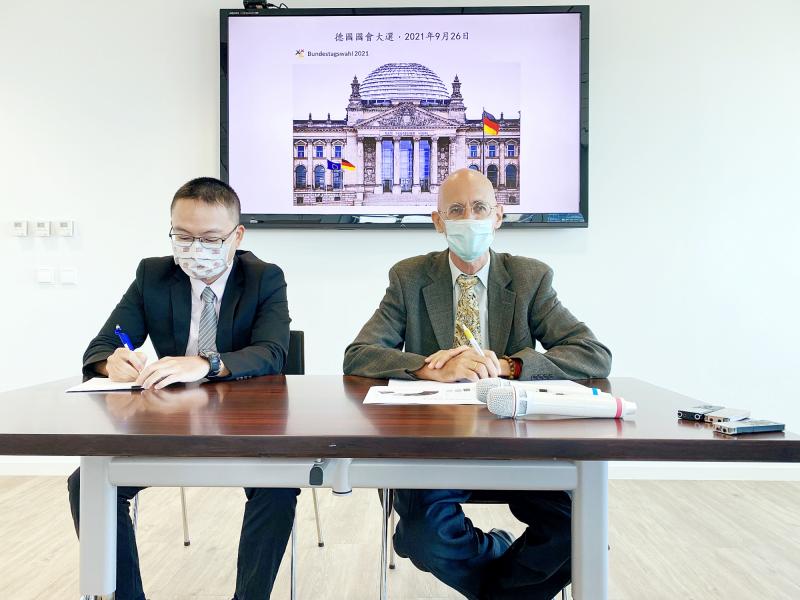Germany welcomes Taiwan Semiconductor Manufacturing Co (TSMC, 台積電) to establish a new fab in Saxony, German Institute Taipei Director-General Jorg Polster said yesterday at a news briefing on the country’s election.
It is the first time the German Institute Taipei has held a briefing on Germany’s parliamentary election, which is “very important,” said Polster, who spoke in German with a Chinese interpreter.
Over the past few months, Germany’s electorate seemed to have undergone some changes regarding their choices, with the margins between the Social Democratic Party and German Chancellor Angela Merkel’s Christian Democratic Union and its smaller sister party the Christian Social Union in Bavaria being close, he said, adding that the Green Party was expected to garner more votes.

Photo: CNA
More observation is needed before knowing how the new German government would approach its relations with Taiwan and China, he said.
Germany last year launched an Indo-Pacific strategy, including a plan to send a patrol vessel to the South China Sea, Polster said.
How the new government would approach the Indo-Pacific strategy would also need more observation, he added.
German lawmakers’ understanding of Taiwan is mainly focused on the security of the Taiwan Strait and Taiwan’s success in curbing the COVID-19 pandemic, he said.
Lawmakers would certainly be interested in forming a delegation to visit Taiwan, but how to make that happen during the pandemic would need to be deliberated after the new government is formed, he said, adding that he hopes to arrange a visit together with the Taipei Representative Office in the Federal Republic of Germany.
In July, TSMC said it was evaluating the feasibility of constructing a semiconductor fabrication plant in Germany.
Berlin welcomes the firm’s establishment plan, Polster said, adding that the east German state of Saxony would be a suitable location.
Polster, who succeeded former institute director-general Thomas Prinz in July, said he has met with Minister of Economic Affairs Wang Mei-hua (王美花) and Minister of Foreign Affairs Joseph Wu (吳釗燮).
While he has not yet met with TSMC’s leaders, as a physicist, he would like to learn more about the company’s plans for the new fab, as well as other developments, he said.
Germany and Taiwan have many small and medium-sized enterprises, so he hopes to learn more about their operations in Taiwan, Polster said, adding that he is interested in visiting Taiwan’s science parks.
Other areas for ongoing cooperation include energy, culture, aviation and judicial exchanges, he said.
Taiwan and Germany regularly hold energy forums, with offshore wind energy being a sector of common interest, he said.
Considering there are many similarities between Taiwan’s judiciary system and Germany’s, he would also like to have more bilateral exchanges on legal institutions and judges, he said.

Taiwanese can file complaints with the Tourism Administration to report travel agencies if their activities caused termination of a person’s citizenship, Mainland Affairs Council Minister Chiu Chui-cheng (邱垂正) said yesterday, after a podcaster highlighted a case in which a person’s citizenship was canceled for receiving a single-use Chinese passport to enter Russia. The council is aware of incidents in which people who signed up through Chinese travel agencies for tours of Russia were told they could obtain Russian visas and fast-track border clearance, Chiu told reporters on the sidelines of an event in Taipei. However, the travel agencies actually applied

New measures aimed at making Taiwan more attractive to foreign professionals came into effect this month, the National Development Council said yesterday. Among the changes, international students at Taiwanese universities would be able to work in Taiwan without a work permit in the two years after they graduate, explainer materials provided by the council said. In addition, foreign nationals who graduated from one of the world’s top 200 universities within the past five years can also apply for a two-year open work permit. Previously, those graduates would have needed to apply for a work permit using point-based criteria or have a Taiwanese company

The Shilin District Prosecutors’ Office yesterday indicted two Taiwanese and issued a wanted notice for Pete Liu (劉作虎), founder of Shenzhen-based smartphone manufacturer OnePlus Technology Co (萬普拉斯科技), for allegedly contravening the Act Governing Relations Between the People of the Taiwan Area and the Mainland Area (臺灣地區與大陸地區人民關係條例) by poaching 70 engineers in Taiwan. Liu allegedly traveled to Taiwan at the end of 2014 and met with a Taiwanese man surnamed Lin (林) to discuss establishing a mobile software research and development (R&D) team in Taiwan, prosecutors said. Without approval from the government, Lin, following Liu’s instructions, recruited more than 70 software

Taiwanese singer Jay Chou (周杰倫) plans to take to the courts of the Australian Open for the first time as a competitor in the high-stakes 1 Point Slam. The Australian Open yesterday afternoon announced the news on its official Instagram account, welcoming Chou — who celebrates his 47th birthday on Sunday — to the star-studded lineup of the tournament’s signature warm-up event. “From being the King of Mandarin Pop filling stadiums with his music to being Kato from The Green Hornet and now shifting focus to being a dedicated tennis player — welcome @jaychou to the 1 Point Slam and #AusOpen,” the